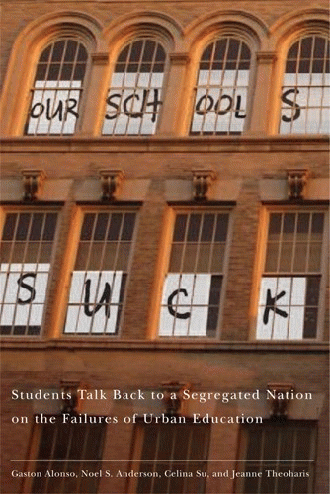"While pundits imply that African American and Latino students choose to drop out because they lack educational values, those who seek to improve the educational performance of young people of color must not only grapple with grim statistics but also investigate what students themselves have to say about their aspirations and the realities of their education."
--Alonso, Gaston; Anderson, Noel; Su, Celina; Theoharis, Jeanne. Our Schools Suck: Students Talk Back to a Segregated Nation on the Failures of Urban Education. New York: NYU Press, 2009, p. 5.
"God is tired of you...
--Bill Cosby, speech at NAACP commemorative Brown gala (2004)
The rhetoric of public figures like Bill Cosby, Juan Williams, Orlando Patterson, and Herman Badillo examined in the first chapter casts public disregard as tough love. God is tired of you. These are young people. God is tired of you. Whose sense of self is still being formed. God is tired of you."
Â
--p. 110.
Â
Â
Our Schools Suck is  an excellent resource for anyone distressed with the "culture of failure" stereotypes commentators, administrators, and politicians have used to disrupt any meaningful intervention into the dilapidated, segregated education system. The authors hold no prisoners in meticulously debunking, dismissing and distilling these much-circulated untruths about "inner-city youth as dark menaces to society, shadowy figures lurking around corners who [refuse] to attend school." [p. 6]
Through compelling stories narrated by the experiences of Black and Latino students in the criminal school system, readers aren't left clueless as to why many of them argue their schools "suck." An alternative title for the book could have been, "A People's History of Urban Education." Howard Zinn's classic text, "
A People's History of the United States: 1492-Present," clearly had an impact on the authors' decision to put at center the voices of Black and Latino students, crying in the wilderness of a heartless education system which appears desperate to hold as many of them back as it can.
The book is facilitated with familiar structural themes that have long mired the educational development of "urban" students: Dilapidated buildings, inadequate resources, understaffing of counselors and teachers, militarization of hallways, overcrowding of classrooms, industrialization of school complexes, criminalization of students, inappropriate security policies, etc. Unfortunately, the book points out, this reality escapes the analyses of esteemed moralists like Dr. Bill Cosby--accused of sexual assault by more than 12 women (one settled out of court)--who "feed the popular perception that dropout rates in the inner cities do not partly stem from societal factors or root causes but instead result entirely from personal choices." [p. 17]
What uninformed critics are nonchalant in acknowledging, they argue, is that, as much as the world is demanded of students, the school system fails woefully in practicing reciprocity. "[T]hese young people are expected to be responsible (about attending school, doing their homework, making plans for college) while the school district does not have to demonstrate an equal level of responsibility in providing" the requisite amount of resources needed to guarantee a "productive learning environment." The hypocrisy of the school system is examined in the case study of a Los Angeles School, Freemont High, which is described as "one of the most troubled schools" in the state. [p. 71]
Freemont is a succinct validation of the well-documented, though highly resisted, assertion of a parallel between the Prison Industrial Complex and the Education Industrial Complex.Â





